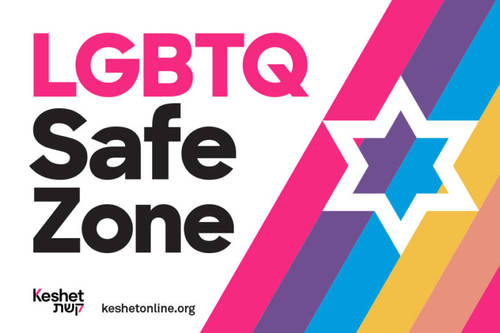Dear friends,
Today, on the eve of Yom Ha-Shoah v’ha-Gevurah (Holocaust Memorial Day), I had the distinct honor of escorting a righteous man, a 99-year old survivor of multiple concentration camps, our friend and congregant Alan Zimm (z”l), to his body’s final resting place. Sadly, this also appeared to be our congregation's first known funeral for someone who died of this terrible plague, COVID-19 (may God remove it from us speedily in our time). Fewer than 10 people were permitted to attend a service that probably would have hosted over 100 mourners. Since we experienced technical problems throughout, and since many were closed out from the Zoom call altogether, I wanted to share my eulogy with you all:
____________________
We began our service this afternoon with the immortal words of Ecclesiastes, that “A season is set for everything, a time for every experience under heaven.” And yet, as we stand here to escort our beloved Alan Zimm to his final physical resting place, it is hard to escape the feeling that it was not yet his time, that he was taken from us before his fixed season. That this can be true of a person who sojourned on this earth for 99 years is a testament to his indelible place in our hearts and his outsized role in our lives. That this can be true of a man who defied the Nazi terror and survived — despite all odds — the horrors of the ghetto and three separate concentration camps is a testament to his extraordinarily resilient spirit. That a man who faced down the Gestapo and the SS and lived to tell the tale could, in the end, be defeated by an invisible, microscopic foe, strains credulity. That a man who so thoroughly and deeply loved a woman to whom he was married for nearly three-quarters of a century, a man whose life centered upon his big and beautiful family, a man whose business as a highly-esteemed clothier and tailor revolved around person-to-person interaction could spend his final days alone because of the unique dangers posed by this vicious plague make the whole ordeal feel somehow surreal, stranger than fiction.
And yet sometimes truth is stranger than fiction. Here we are, in real life, escorting our dear friend to his final physical resting place. The painful truth, as moments like these remind us, is that none of us is destined to live forever. And moreover, none of us knows with certainty the measure of our days. There may indeed be a set season for everything, a time for every experience — but the fate of humanity is to live with incomplete and imperfect knowledge of when these seasons and times may occur. That, ultimately, is why Ecclesiastes determines “that there is nothing better for a person than to enjoy his work, since that is his portion. For who can enable him to see what will happen afterward?” And the wise old king teaches further that in the face of life’s profound uncertainty “one should eat and drink and get pleasure with all the gains he makes under the sun, during the numbered days of life that God has given him; for that is his portion.” In other words, since we do not know if our time on this earth will be 20 or 50 or 100 years, we should find work that we love and devote ourselves to it each day with pride and with wholeness of heart; that we should know love; that we should enjoy life’s simple pleasures; that we should regard each and every day as a singular blessing, and encounter that day with gratitude, with generosity, and with joy; that we should take no day — no moment — as well as no thing for granted.
Whether Alan naturally possessed this quality, or whether he learned it through enduring the unthinkable challenges he encountered during the course of his life, Alan Zimm was a man who took no day and no thing for granted, for whom every single day was a gift, a blessing. After the war, he found work that he enjoyed and in which he took pride, and he devoted himself to it, he put his heart and soul into each day’s work, becoming a recognized master in his adopted field, continuing to work well past the age many opt for a life of leisure in warmer climates. He enjoyed life’s simple pleasures — a bottle of Sprite, a chocolate or some other individually-wrapped sweet treat, a melt-in-your-mouth osso bucco. He got profound satisfaction from learning, from reading, from being steeped in history and from being knowledgeable about current affairs. He got a surprising amount of happiness from a simple game of ping pong.
And, more than anything, Alan loved being with and nurturing his family; no matter what he was doing, he was happy so long as he was with Halina, his children, and his grandchildren. He deeply cherished his brother Sol, of blessed memory, with whom he was miraculously reunited in a DP camp. As the only two members of their family to have survived the Shoah, Alan and Sol remained extremely close; even after Sol’s untimely passing, Sol’s family, including and especially Sol’s wife and Halina’s sister, Helen, of blessed memory, were as the members of his own household. He loved stealing away every day at 12:30 for lunch at home with Halina. He loved the family vacations, the family Shabbos dinners and holiday celebrations, the family gatherings in shul on yuntiff, the family participation and visits at the shop — whenever it involved his family, Alan was happy.
And in turn, Alan was committed to making those around him happy, to ensuring that they, too, would celebrate life and see the blessing in each moment and in each day. That’s why he was always offering you a piece of candy, asking if you’d had enough to eat. That’s why he became the master of the dad jokes. That’s why he was always squeezing your knees and asking whether you had water in them. It’s not (only) because those gags tickled his own funny bone, although they did. It’s because he was always working hard to make sure you were enjoying life — you were seeing the joy in life, the gift in each moment — as much as he was, and as much as he did.
In this way, Alan was true to his profession. He was a tailor by trade, and also in life. Because whatever he did, he was mending and sewing. He was a mender of broken hearts, a weaver of relationships, a connector of family and community. Alan made people fit together and feel comfortable with themselves and with one another the same way he made clothes fit perfectly, and in the same way he made people feel comfortable in whatever they were wearing. Alan was cut from a whole cloth, tokho k’varo as our rabbis taught about the Holy Ark, the same inside as on the outside, the same in private as he was in public — a tailor at work, and a tailor at home; a caring, reliable, earnest presence at home, and a caring, reliable, earnest presence in the marketplace. Another word for this is integrity. And Alan Zimm was nothing if not a man of integrity, an upright, decent, and altruistic man without a bad bone in his body, relentlessly optimistic, and perpetually sincere.
Alan did all of this without desire for reward, without pursuit of fame or fortune or glory, but out of love — love of life, love of work, love of family, love of his people and community. Indeed, Alan was known for his calm, for his reserve, for his gentleness. He was a man of few words, a quiet yin to Halina’s gregarious and loquacious yang. He reflected in his character the teaching of the ancient Jewish sage Shammai, recorded in the Mishnah:
עֲשֵׂה תוֹרָתְךָ קֶבַע. אֱמֹר מְעַט וַעֲשֵׂה הַרְבֵּה, וֶהֱוֵי מְקַבֵּל אֶת כָּל הָאָדָם בְּסֵבֶר פָּנִים יָפוֹת:
Make your teaching consistent; say little, and do much; and receive all people with a pleasant countenance.
Alan Zimm was a man of stability, of consistency, of personal discipline, and of few words. Of course, he spoke out when it mattered — like when he testified on Capitol Hill about the horrors of the Dora-Mittelbau concentration camp, calling out the US government for resettling one of its most notorious engineers; and he and Halina shared their stories of heroism and survival with countless students over the years — but as a general rule he kept his peace, including never complaining about or protesting any of the great misfortunes that had befallen him in his life. Instead, he let his resilience, his kindness, his sweetness, his good cheer, and above all his worthy deeds speak for him. In this way, he was the best kind of teacher for his family and his community — the kind that demonstrates by personal example how to live in this world.
And I want to suggest that Alan continued to teach by example even in his final days. As he confronted his mortality, he was not, in the words of the poet Mary Oliver, “sighing and frightened, or full of argument.” Rather, he kept his peace, treating each moment, each breath, as a blessing, rather than protesting or fretting about the future breaths he knew he was destined not to draw. This was his final teaching, consistent with all the Torah he had taught you throughout his life — to treat the present as a gift, rather than holding on too tightly to the past or fretting too much about the future. There is no doubt a painful irony in the fact that a man who was such a weaver of relationships left this world in what seems to be such a lonely way. But while Alan spent his final weeks without being able to be physically near his beloved family, he was not alone. The ties that bound him to you, and you to each other, transcend space and time. You were with him then, just as sure as he is with you now; just as sure as he will remain with you forever; this expert sewer of buttons and fabric also wove your souls together into an intricate and beautiful and inseparable garment. In this, too, Alan taught us through his actions — that the bonds forged by love cannot be broken. Even isolating illness, even death cannot sever the seams. We need not be in one another’s physical presence to remain inalterably connected to one another. You were with him in the end, just as sure as he is with you now; just as sure as he will remain with you forever.
Alan’s passing has ruptured the fabric of our lives. Of this there can be no question. But if Alan taught us anything, it was how to mend a torn garment. With acceptance, dedication, devotion, and love, we too can repair what has been ripped apart, ensuring that our dear Alan Zimm will always be part of our lives and part of this world, in death as in life; that our souls will always be bound with his, in death as in life; and that the bonds of your family and the Jewish people will be eternally stronger for having been touched by this expert tailor.
May the soul of Alan Zimm be bound up in the bonds of everlasting life, and may his memory be a blessing. Amen.



